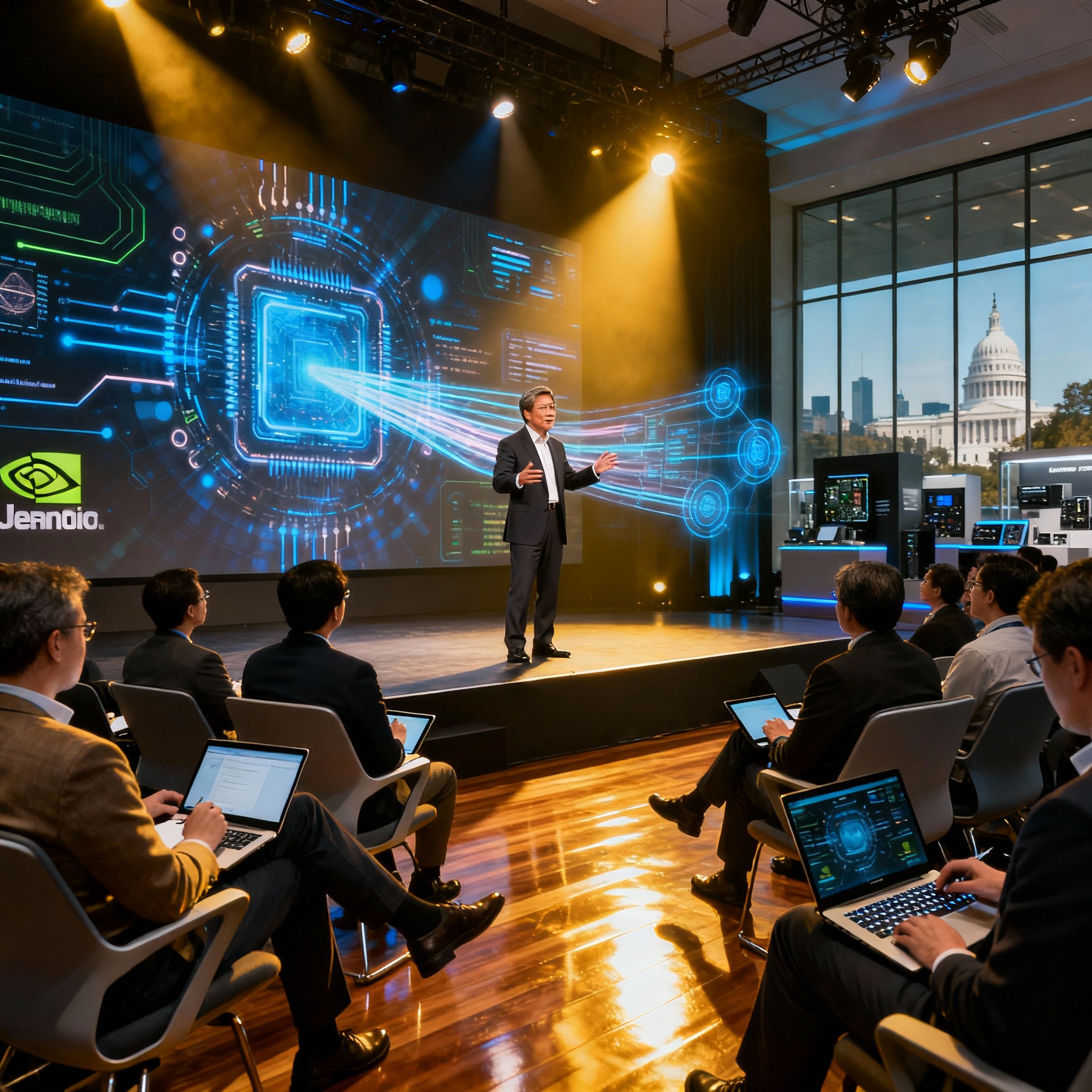AI Spending Crisis: NVIDIA's Quantum Leap vs. Microsoft & Meta's Investor Backlash - October 2025

NVIDIA's quantum-AI breakthrough, highlighted by the unveiling of stable logical qubits, has ignited a $500 billion surge in orders, signaling immense confidence in its potential to revolutionize industries like drug discovery and cryptography. To capitalize on this AI revolution, understand how NVIDIA's NVQLink facilitates seamless communication between quantum processors and traditional GPUs, accelerating overall computation. Stay ahead of the curve by monitoring how competitors like Microsoft and Meta respond to this paradigm shift in the AI landscape.
NVIDIA's Quantum-AI Breakthrough and $500 Billion Blackwell Demand
The AI world was set ablaze at NVIDIA's GTC 2025, not just by incremental improvements, but by a quantum leap: Jensen Huang's unveiling of a stable, error-corrected logical qubit. It was a moment many had dreamed of, as it signaled a tangible step towards realizing the late Richard Feynman's vision of quantum computers finally being capable of simulating nature itself – a feat previously relegated to the realm of theoretical physics.
NVIDIA's Quantum Dream: Turning Theory into Reality
For decades, the promise of quantum computing has been tantalizingly close, yet plagued by the inherent instability of qubits. These quantum bits, unlike classical bits, are susceptible to noise and decoherence, making them prone to errors. Huang's announcement claimed to solve this issue, presenting a pathway towards fault-tolerant quantum computation. This is particularly exciting because it could unlock unprecedented computational power, enabling us to tackle problems currently intractable for even the most powerful supercomputers. To achieve this ambitious goal, NVIDIA has reportedly committed to building seven U.S.-based supercomputers, dedicated to resolving the persistent qubit stability challenges.
Integral to this quantum-AI convergence is NVQLink, NVIDIA's high-speed interconnect system. This innovative technology facilitates seamless communication between quantum processing units (QPUs) and traditional GPU supercomputers. Imagine it as a super-fast data highway, enabling the QPUs to focus on quantum calculations while leveraging GPUs for pre- and post-processing tasks. This synergy is crucial for hybrid quantum-classical algorithms, where each processor handles the tasks it's best suited for, significantly accelerating overall computation.
The Blackwell Bonanza: $500 Billion in Orders
The implications of a stable qubit, combined with the power of the Blackwell architecture, are far-reaching. Industries poised for disruption include drug discovery (designing new molecules with atomic precision), materials science (creating novel materials with enhanced properties), and cryptography (developing unbreakable encryption methods). The market has clearly recognized this potential. Orders for the Grace Blackwell architecture have reportedly surged, reaching an astounding $500 billion, reflecting the immense confidence in NVIDIA's ability to deliver on its quantum-AI promise. This surge in demand also highlights the critical importance of tools like NVIDIA AI Workbench for developers eager to harness this technology.
This quantum-AI convergence represents a paradigm shift, promising not just incremental improvements, but entirely new possibilities. NVIDIA's bold move is not without its risks, but the potential rewards could reshape industries and redefine the limits of computation, truly making it an AI News story for the ages. The next question on everyone's mind: will Microsoft and Meta follow suit, or will they be left behind in this new quantum era?
Microsoft's Aggressive Data Center Expansion Amid Investor Concerns
As NVIDIA soars, Microsoft is taking a different path, one fraught with risk and investor skepticism. The tech giant is embarking on an ambitious plan to double its global data center network within the next two years, a move essential to supporting its burgeoning AI initiatives. This expansion, however, comes at a steep price, and investors are starting to show signs of unease.

The Price of Ambition: Microsoft's Q1 Spending Spree
Microsoft's commitment to AI is undeniable, but the financial implications are becoming increasingly apparent. In the first quarter, the company's capital expenditures reached a staggering $34.9 billion, significantly exceeding initial guidance. This massive outlay reflects the intense investment required to build and maintain the infrastructure necessary for AI development and deployment. While Microsoft Copilot has been making waves with its AI-powered productivity features, the costs associated with powering these features are considerable.
Investor Jitters and Market Reaction
The market reacted swiftly to the news of Microsoft's escalating spending. Shares dropped by 4%, signaling investor concerns about the company's ability to effectively monetize its AI investments. While CEO Satya Nadella has pledged to boost AI capacity by 80% this year, the lack of clear timelines for profitability is fueling uncertainty. Investors are essentially asking: when will these massive investments start to pay off? While tools like Azure Machine Learning offer robust platforms for AI development, the path to recouping the costs of such infrastructure remains unclear.
The core issue isn't whether AI is the future, but rather when and how these investments will translate into tangible financial returns for Microsoft. This uncertainty is what's driving investor apprehension.
Analysis of Microsoft's Q1 Revenue and Operating Income
Despite the concerns, Microsoft's Q1 results paint a complex picture. While revenue continues to grow, operating income hasn't kept pace, indicating increased cost pressures. The company is walking a tightrope, balancing the need to invest aggressively in AI with the imperative to maintain profitability and shareholder confidence. The challenge lies in demonstrating that its long-term vision for AI aligns with near-term financial realities. Tools like n8n, an AI-powered workflow automation platform, can certainly help optimize operational efficiency, but the fundamental question of ROI on AI infrastructure remains.
Microsoft's aggressive data center expansion underscores its unwavering belief in the transformative power of AI, however, it also highlights the financial risks inherent in pursuing such a bold strategy. As the company continues to navigate this complex landscape, all eyes will be on its ability to deliver concrete results and alleviate investor anxieties. The next section will delve into how Meta is trying to balance its AI ambitions with its Metaverse investments, another company facing investor pushback on AI spending.
Meta's $70 Billion AI Bet and Stock Plunge: A Gamble on the Future?
Is Meta’s massive AI investment a bold leap into the future or a reckless gamble? The company's aggressive push into artificial intelligence has investors on edge, particularly after the announcement that Meta is increasing its AI capital expenditures beyond a staggering $70 billion for 2025. This bold move was met with immediate skepticism, evidenced by a 7% stock decline in after-hours trading. The question on everyone's mind: Is Meta's AI bet worth the risk?

Investor Unease and Zuckerberg's Vision
Investor concerns are primarily fueled by the uncertainty surrounding immediate returns on such a large investment. While Mark Zuckerberg remains steadfast in his belief that AI is the future, his strategic moves are under intense scrutiny. His significant investment in Scale AI and the appointment of Alexandr Wang as chief AI officer signal a clear commitment. However, investors are wary, demanding more than just a vision; they want to see concrete results.
Meta's Restructuring of AI Division
Adding to the complexity, Meta is undergoing a significant restructuring of its AI division. This includes the elimination of 600 employees, a move designed to streamline operations and sharpen focus. This Meta AI spending 2025 is aimed at driving innovation, but job losses always raise questions about morale and potential disruptions. Restructuring is a double-edged sword; it can pave the way for efficiency, but it can also create instability and hinder progress, at least in the short term.
Justifying the AI Investment
Meta defends its AI spending by claiming that these investments are already enhancing advertising operations and the algorithms powering Instagram Reels. AI-driven improvements in ad targeting and content recommendation are expected to boost revenue and user engagement. Furthermore, the company believes that AI will play a crucial role in developing new products and experiences, particularly in the metaverse. However, these are long-term goals, and the immediate Meta stock decline AI investment reflects investor impatience. It's a classic case of Wall Street's short-term focus clashing with Silicon Valley's long-term vision.
Risk Review Team Downsizing
In a move that has raised eyebrows, Meta is also downsizing its risk review team to accelerate AI product development. While speed to market is essential in the fast-paced world of AI, cutting corners on risk assessment could have severe consequences. Ethical considerations and potential biases in AI algorithms are critical concerns, and a robust risk review process is necessary to mitigate these dangers. A misstep in this area could lead to public relations disasters and regulatory scrutiny, potentially undermining Meta's entire AI strategy. It highlights the tension between rapid innovation and responsible AI development, a challenge that all tech companies are grappling with. As AI continues to evolve, it's important to stay updated with AI News to understand the implications of these advancements.
Alphabet's Cloud Growth and $155 Billion AI Contract Backlog: A Different Story

While NVIDIA basks in the glow of its quantum leap and Microsoft and Meta face investor scrutiny, Alphabet paints a different picture of AI spending and growth, showing that strategic AI investments can indeed yield impressive results. Let's delve into how Google's parent company is navigating the AI landscape.
Exceeding Expectations and Cloud Dominance
Alphabet's third-quarter sales soared beyond expectations, clocking in at a remarkable $87.5 billion. But the real story lies within the robust growth of Google Cloud. Revenue from Google Cloud surged by an impressive 32% year-over-year, demonstrating the company's increasing dominance in the cloud computing space. This growth is not just incremental; it's a testament to Google's strategic positioning in the AI era. A significant driver of this success is their growing "Alphabet AI contract backlog".
Alphabet's success proves that AI investments, when strategically executed, can lead to substantial revenue growth and investor confidence.
The $155 Billion Backlog and Billion-Dollar Deals
Adding fuel to the fire is Google Cloud's staggering $155 billion contract backlog. This massive figure underscores the long-term commitments that businesses are making to Google Cloud, betting on its capabilities to power their digital transformations. What’s more, Google has secured more $1 billion deals in the past nine months than in the previous two years combined, signaling a significant acceleration in its ability to land major enterprise clients. This impressive growth can be attributed to Google’s AI-first approach in cloud computing. An important term to follow here is "Alphabet AI contract backlog", given its importance to Google's growth.
Google's Deals with Meta and Anthropic
Google's strategic partnerships are also paying dividends. High-profile deals with companies like Meta and Anthropic to provide cloud services and Tensor Processing Units (TPUs) are cementing Google Cloud as the preferred choice for AI-driven organizations. Anthropic uses Google's TPUs to train and deploy its AI models, showcasing the power and efficiency of Google's AI infrastructure. Meanwhile, Meta leverages Google Cloud's scalable infrastructure for various AI and machine learning workloads. These collaborations are significant validations of Google's technological prowess and strategic vision. Google is experiencing "Google Cloud revenue growth 2025", and it is showing no signs of slowing down.
Stock Surge and Market Confidence
The market has responded positively to Alphabet's financial performance, with the stock surging 6% in after-hours trading. This surge reflects investor confidence in Alphabet's ability to capitalize on the AI boom and deliver sustainable growth. Unlike the investor backlash faced by some of its competitors, Alphabet's stock performance signals that its AI strategy is resonating with Wall Street.
The Preferred Choice for AI Startups
Notably, Google Cloud is becoming the go-to platform for many AI startups seeking robust computing power. This trend is fueled by Google's cutting-edge AI infrastructure, which includes TPUs and a comprehensive suite of AI development tools, allowing these startups to innovate faster and more efficiently. This ecosystem effect further solidifies Google Cloud's position as a leader in the AI cloud landscape.
Alphabet's success story highlights the importance of a well-defined AI strategy and the ability to execute on it effectively. While some companies face challenges in justifying their AI investments, Google's approach is clearly paying off, driving revenue growth, securing major deals, and boosting investor confidence. As the AI race intensifies, Google's cloud momentum positions it as a formidable contender, one that other tech giants will be watching closely. The next section will examine the specific AI technologies Alphabet is betting on.
The News/Media Alliance's Call for AI Regulation: Copyright and the Future of Innovation

In a move that underscores the growing tension between AI development and intellectual property rights, the News/Media Alliance (NMA) has emerged as a vocal advocate for establishing clear, enforceable rules governing the AI landscape. Their stance highlights a critical debate: how do we foster AI innovation while protecting the rights of content creators whose work fuels these powerful systems?
The NMA's Push for AI Regulation
The News/Media Alliance, representing a vast network of news and media organizations, is calling for new regulations on AI News development, focusing heavily on the protection of intellectual property. They argue that a robust system of IP rights is not an obstacle to AI advancement but rather a crucial ingredient for its long-term success. The NMA is urging the Office of Science and Technology Policy (OSTP) to actively reduce barriers that impede cooperation between AI developers and content creators. This cooperation, they believe, is essential for creating AI systems that are both innovative and respectful of existing copyright laws.
Echoes of the Past: A Presidential Call to Action
Interestingly, the NMA's current efforts resonate with past statements made by former President Trump, who emphasized the need for 'brilliant' AI rules. While the specific context and details of Trump's vision may differ, the underlying sentiment – that AI requires careful and thoughtful governance – remains relevant. The challenge now lies in translating that sentiment into concrete policies that address the complex issues at hand. If you're unsure what AI is, you can checkout the AI beginner's guide at AI News to get up to speed.
Copyright Conflicts: The Core of the Dispute
At the heart of the NMA's concerns is the issue of training data. Media organizations are increasingly worried about the use of their copyrighted material to train large language models (LLMs) without proper licensing or compensation. This has led to mounting pressure and, in some cases, legal action against major players like OpenAI, Google, and others. These organizations are using tools like ChatGPT, a versatile language model used for text generation and conversation, to create content. The core of the legal arguments is that the unauthorized use of copyrighted material infringes upon the rights of content creators and undermines the economic viability of the news and media industry.
The conflict between AI developers and content creators over copyright is becoming increasingly prominent, with high-stakes legal battles and intense negotiations shaping the future of AI ethics and AI Regulation Copyright. The outcome of these conflicts will have far-reaching implications for the entire AI ecosystem.
The push for News Media Alliance AI Policy underscores the need for a balanced approach to AI development, one that fosters innovation while safeguarding the rights of those who create the content that makes AI possible. This balance is crucial for ensuring a sustainable and equitable future for both the AI industry and the content creation ecosystem.
Analysis: AI's Inflection Point - Winners, Losers, and the Market Reality Check
The AI landscape in October 2025 presents a fascinating paradox: unprecedented technological momentum colliding head-on with investor impatience. On one hand, companies like NVIDIA are experiencing record growth, fueled by insatiable demand for their AI chips and the promise of quantum computing breakthroughs. On the other, tech giants like Microsoft and Meta are facing investor scrutiny and stock market dips following announcements of increased AI spending. This divergence highlights a critical inflection point for the AI industry, forcing a market reality check.
The Tale of Two Stocks
The contrasting stock market reactions to AI spending are telling. NVIDIA's surge reflects confidence in its ability to capitalize on the AI boom now, while the struggles of Microsoft and Meta suggest investors are wary of long-term bets without immediate returns. The market is beginning to differentiate between companies demonstrating tangible commercial traction from those whose AI strategies rely more on future promises. This is especially evident when considering the difference between deploying existing technologies and the higher-risk, higher-reward endeavors of developing new, unproven AI capabilities. Tools like TensorFlow and PyTorch continue to empower developers, but translating that power into profit is proving to be a challenge for some.
Regulation Lag and the Quantum Leap
Adding to the complexity is the slow pace of political and legal frameworks to keep pace with AI's rapid deployment. Ethical considerations, data privacy, and the potential for job displacement are just some of the issues demanding urgent attention. Furthermore, the concurrent breakthroughs in quantum computing and record infrastructure demand are pushing the boundaries of what's technologically possible, even as profitability pressures mount. It's a high-stakes game of balancing innovation with fiscal responsibility. These advancements are all covered in detail in AI News, keeping you ahead of the curve.
Winners and Losers in the AI Arena
The coming months will likely see a separation of industry winners and losers. Companies that can demonstrate sustainable business models, clear paths to profitability, and a responsible approach to AI development will thrive. Those who fail to meet these criteria may face investor disillusionment and a struggle for survival. It's no longer enough to simply be "doing AI"; companies must prove they can do it profitably and ethically. One crucial aspect of this is related to AI spending profitability and ensuring that investments yield tangible results. Additionally, understanding the quantum computing market reality will be essential for companies looking to stay ahead in this rapidly evolving landscape.
Ultimately, AI's inflection point demands a more pragmatic and discerning approach. The hype is giving way to scrutiny, and only those companies with solid foundations and a clear vision will emerge as true leaders in the AI revolution.
🎧 Listen to the Podcast
Hear us discuss this topic in more detail on our latest podcast episode: https://open.spotify.com/episode/3ypkbMRV7s2Cq43ZDTGYKL?si=XnpUEx75To-7kBLdEdnVZQ
Keywords: AI, Artificial Intelligence, Quantum Computing, NVIDIA, Microsoft, Meta, Alphabet, Google Cloud, AI Spending, Data Centers, Investment, Copyright, AI Regulation, Blackwell Architecture, Investor Concerns
Hashtags: #AI #ArtificialIntelligence #QuantumComputing #TechNews #Investing
For more AI insights and tool reviews, visit our website https://best-ai-tools.org, and follow us on our social media channels!
Website: https://best-ai-tools.org
X (Twitter): https://x.com/bitautor36935
Instagram: https://www.instagram.com/bestaitoolsorg
Telegram: https://t.me/BestAIToolsCommunity
Medium: https://medium.com/@bitautor.de
Spotify: https://creators.spotify.com/pod/profile/bestaitools
Facebook: https://www.facebook.com/profile.php?id=61577063078524
YouTube: https://www.youtube.com/@BitAutor
Recommended AI tools
Nomi.ai
Conversational AI
Empowering AI Conversations
StockCake
Image Generation
Baking the perfect stock analysis for you
StockStory
Data Analytics
Uncover the narrative behind the numbers.
AInvest
Data Analytics
Empowering your investment decisions with AI
EarnBetter
Productivity & Collaboration
Maximize Your Earnings with EarnBetter
Intapp DealCloud
Data Analytics
Find, win, and execute more business with Intapp DealCloud


